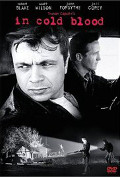
Directed by
Richard Brooks
134 minutes
Rated MA
Reviewed by
Bernard Hemingway


In Cold Blood
From its opening sequence with Conrad Hall’s rich black-and-white photography underscored by Quincy Jones’s music Richard Brooks’ In Cold Blood makes a stylish promise on which it amply delivers.
The film tells the story of the seemingly senseless real life 1959 murders of a Kansas farming family by a couple of small-time ex-cons, Perry Smith (Robert Blake) and Dick Hickock (Scott Wilson). Brooks, adapting Truman Capote's classic account of the killings and the killers, stays close to his source material making the film a compelling character study as well as maintaining a strong degree of authenticity (real citizens of Holcomb and actual locations like the Clutter farmhouse were used, and both Blake and Wilson bear a physical resemblance to their real-life counterparts).
Although occasionally the film indulges in B-grade psychologizing as it confronts the burning question of why the reprehensible event happened for the most part Brooks effectively responds by staying focussed on the two men’s personalities. Smith came from a broken home, his father (well-played by 1940s crime film regular, Charles McGraw) being a delusional dreamer and volatile drunk and his mother abandoning her family, leaving him to grow up in orphanages. Hickock who was from a dirt-poor share-cropper background had an oily charm but the moral fibre of a hyena. Both men had served time for petty crime. It was while in prison that Hickock heard about the Clutters, a Kansas farming family who supposedly had a home safe chock-full of cash and embroiled Smith in what would be the "perfect score".
In the first part of the film Brooks opposes the two worlds of the victims and the perpetrators, God-fearing, church-going folk on the one hand, shiftless opportunists on the other, cutting from one scene in one world to a similar one in the other before breaking off prior to the actual murders which are not shown until later in the film. Most of film is given over to the relationship between the two men from immediately afterwards until their capture. It is here that we get the characterisation that provides the strength of the film. Wilson who had only had one previous screen appearance in In The Heat Of The Night released the same year, is chillingly effective as the glibly conscienceless prime mover whilst Blake, who starting as child actor had had a long career in television, is memorable, as the emotionally and mentally troubled Perry. Capote is not mentioned although Brooks gives us a stand-in in the form of a liberal reporter (Paul Stewart). It is his dialogues with John Forsythe's police investigator that results in most of the B-grade effects.
Whether the final section of the film, which covers the men’s five year wait on Death Row was necessary is debatable, however In Cold Blood is one of those films whose merits far outweigh its short-comings.
FYI: Blake, who went onto become a TV star in Baretta, had a rocky time with drug and alcohol abuse and was accused and acquitted of his wife’s murder in 2001. Capote and his famous account of the Clutter murders was the subject of two subsequent films Capote in 2005 and Infamous in 2007.
Want something different?





